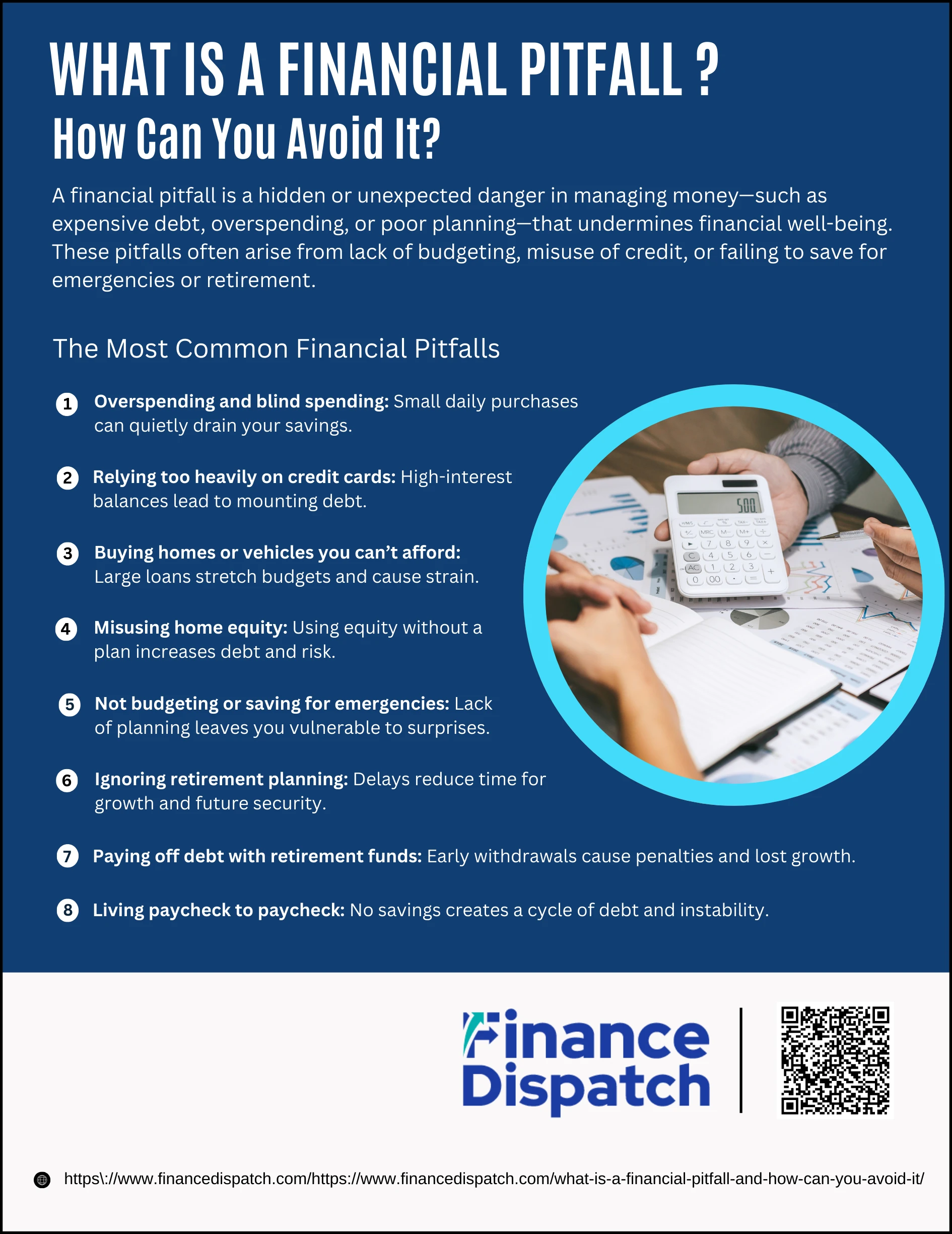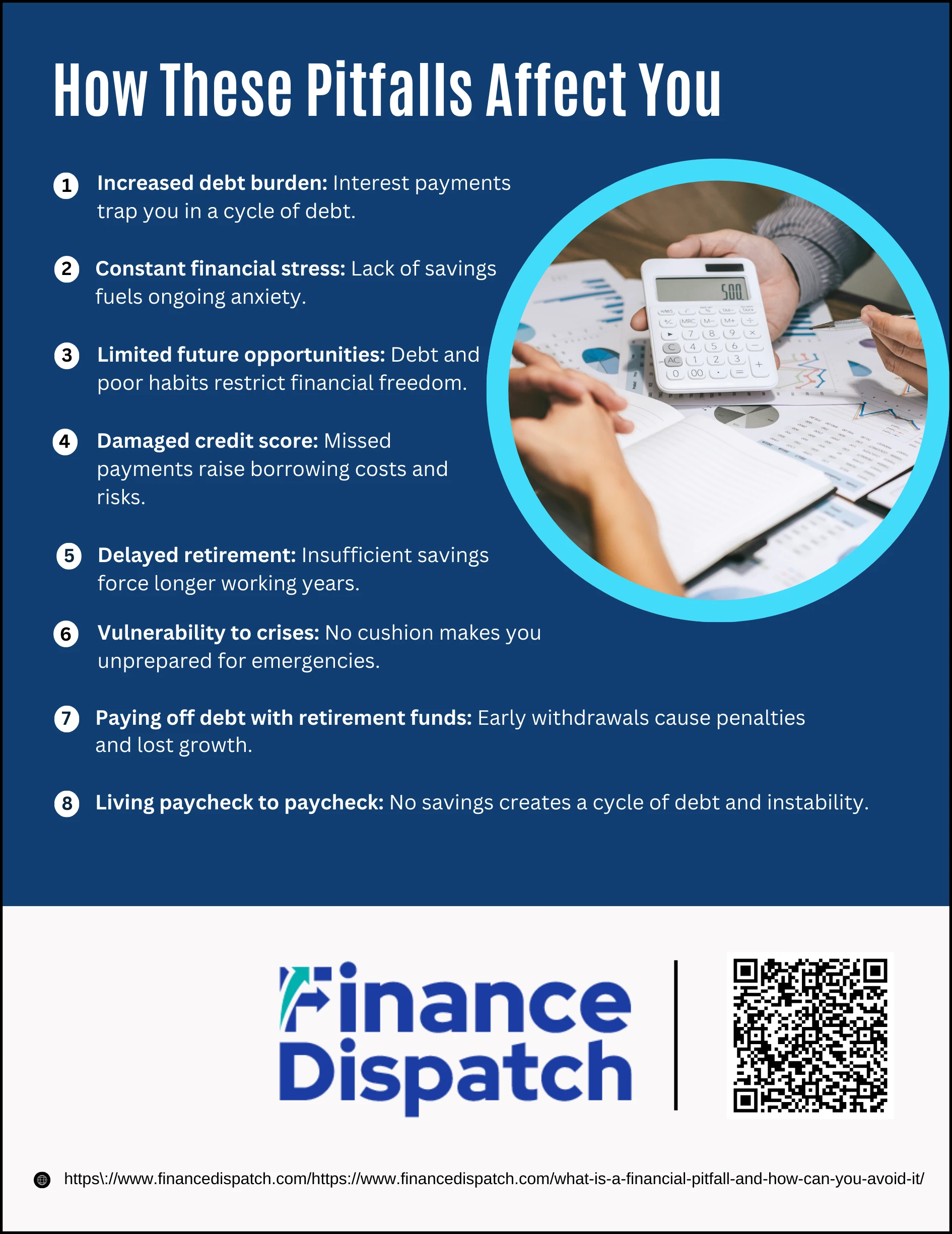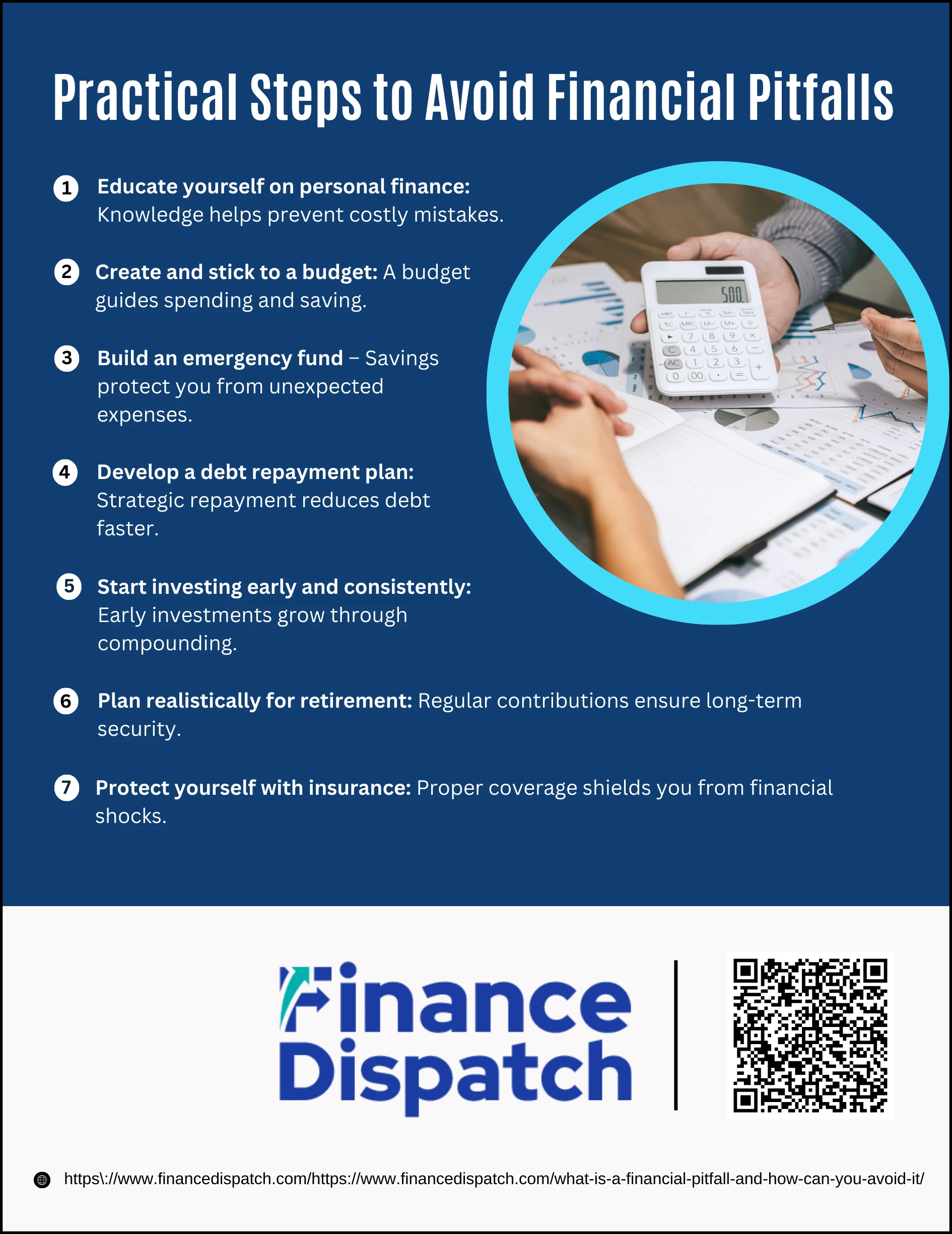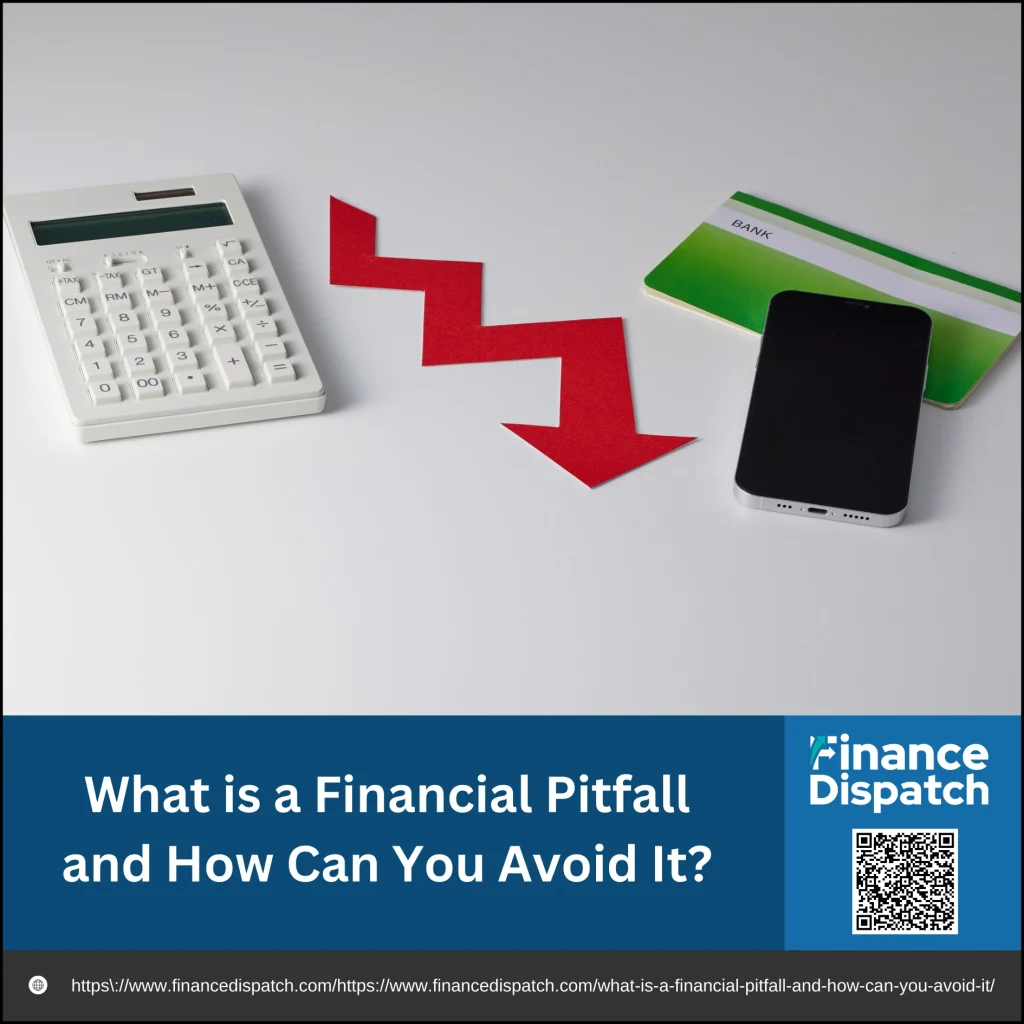Managing money isn’t just about how much you earn—it’s about how wisely you use it. Many people fall into financial pitfalls, which are common mistakes or habits that quietly drain your income, create unnecessary stress, and limit your future opportunities. From overspending on little things to taking on debt you can’t realistically handle, these traps can leave you struggling to stay afloat. The good news is that with awareness and a proactive approach, you can spot these pitfalls early and take simple steps to avoid them, paving the way toward greater financial stability and peace of mind.
What is Financial Pitfalls?
A financial pitfall is a mistake or poor money decision that undermines your financial stability. It can be as small as spending beyond your budget on daily luxuries or as serious as taking on high-interest debt without a repayment plan. These pitfalls often creep in quietly—through habits like blind spending, ignoring savings, or failing to plan for the future—and over time, they can create stress, limit opportunities, and even lead to long-term financial hardship. Recognizing them is the first step to building healthier financial habits and securing your future.
Why People Fall Into Financial Mistakes
Many people don’t set out to damage their finances, but certain habits, pressures, and knowledge gaps can easily lead them astray. Understanding why these mistakes happen is the first step to preventing them.
1. Lack of financial education – Without learning the basics of budgeting, saving, and investing, it’s easy to make costly errors.
2. Emotional decision-making – Stress, fear, or excitement often drive impulsive purchases or poor investment choices.
3. Social pressure – Trying to “keep up with the Joneses” can push people to overspend on homes, cars, or lifestyles they can’t afford.
4. Procrastination and avoidance – Putting off budgeting, saving, or tackling debt allows problems to grow bigger over time.
5. Failure to plan for the future – Ignoring retirement savings, insurance, or emergency funds leaves people unprepared for unexpected challenges.
 The Most Common Financial Pitfalls
The Most Common Financial Pitfalls
Financial pitfalls often stem from everyday choices that seem harmless at first but add up over time. By recognizing these mistakes, you can take steps to avoid unnecessary stress and protect your long-term financial health.
1. Overspending and blind spending
Many people underestimate how small, frequent purchases—like daily coffee runs, dining out, or online shopping—can quietly drain their finances. When these expenses aren’t tracked, they chip away at savings and create budget gaps that could otherwise be used for important goals.
2. Relying too heavily on credit cards
Credit cards can provide convenience, but high interest rates make them dangerous if balances aren’t paid in full each month. Relying on credit for everyday expenses leads to mounting debt, where interest charges often exceed the original cost of items purchased.
3. Buying homes or vehicles you can’t afford
Purchasing a house or car based solely on the monthly payment can be misleading. Large loans, combined with insurance, taxes, and upkeep, can stretch budgets too thin. This leaves little room for savings or emergencies and may lead to long-term financial strain.
4. Misusing home equity
Tapping into home equity through refinancing or a line of credit may seem like easy money, but it reduces ownership in your home and adds more debt. Without a clear repayment plan, this can result in higher interest costs and greater financial risk.
5. Not budgeting or saving for emergencies
Living without a budget often results in overspending and little to no savings. Without an emergency fund, unexpected expenses—like medical bills, job loss, or car repairs—can force you into debt or create severe financial stress.
6. Ignoring retirement planning
Delaying retirement savings means losing valuable time for compound growth. Waiting until later years to invest requires larger contributions, which may not be sustainable, and could lead to working far longer than expected.
7. Paying off debt with retirement funds
It might seem logical to dip into retirement savings to clear high-interest debt, but this often backfires. Early withdrawals come with penalties and taxes, and once the money is gone, it’s hard to replace. You also lose years of potential growth that retirement accounts provide.
8. Living paycheck to paycheck
Relying solely on each paycheck for survival leaves no room for setbacks. Even a small disruption—like reduced work hours or a sudden bill—can cause financial chaos. Without savings, you’re forced to rely on credit, creating a cycle of debt that’s difficult to escape.
 How These Pitfalls Affect You
How These Pitfalls Affect You
Financial pitfalls don’t just hurt your wallet in the short term—they can also shape your overall lifestyle, stress levels, and long-term stability. The impact often grows over time, making it harder to recover if left unaddressed.
1. Increased debt burden
When you rely too heavily on credit cards or loans, interest charges accumulate quickly. Instead of paying off the original amount, much of your money goes toward servicing interest, keeping you stuck in a cycle of debt that becomes harder to break as time passes.
2. Constant financial stress
Living paycheck to paycheck or without emergency savings can create a lingering sense of anxiety. Every surprise expense—whether a car repair, medical bill, or job disruption—feels overwhelming, leaving you stressed and distracted in daily life.
3. Limited future opportunities
High debt and poor savings habits restrict your financial flexibility. Opportunities like investing, starting a business, buying a home, or even taking a vacation become out of reach because your income is tied up in repayments and basic survival expenses.
4. Damaged credit score
Missing payments or using too much credit can significantly lower your credit score. A poor score doesn’t just limit your access to loans—it also increases borrowing costs, making mortgages, car loans, or even renting an apartment more expensive in the long run.
5. Delayed retirement
Neglecting retirement planning leaves you with little to no savings for your later years. This often forces people to work longer than they planned, reducing their ability to enjoy financial freedom and placing more pressure on their health and lifestyle.
6. Vulnerability to crises
Without a financial cushion, unexpected events can derail your entire budget. A sudden illness, job loss, or home repair can push you into debt quickly, creating a domino effect where one problem triggers long-term financial instability.
 Practical Steps to Avoid Financial Pitfalls
Practical Steps to Avoid Financial Pitfalls
The good news is that financial mistakes can be corrected and even prevented with consistent habits and smart planning. By taking small, intentional steps, you can build a stronger financial foundation and protect yourself from the traps that often cause stress and debt.
1. Educate yourself on personal finance
Many financial mistakes stem from a lack of knowledge. Taking time to learn about budgeting, saving, investing, and debt management gives you the tools to make informed choices. Books, online courses, and workshops are affordable ways to build confidence in managing money.
2. Create and stick to a budget
A budget is your financial roadmap. By tracking income and expenses, you see where your money actually goes and can identify areas of overspending. Sticking to a realistic budget helps balance your needs and wants while freeing up money for savings and long-term goals.
3. Build an emergency fund
Life is unpredictable, and sudden expenses—like car repairs, medical bills, or job loss—can derail your finances. Saving three to six months’ worth of expenses creates a safety net so you don’t have to rely on high-interest debt during emergencies. Even small, regular contributions add up over time.
4. Develop a debt repayment plan
Debt can quickly become overwhelming if not managed strategically. Listing all debts and prioritizing repayment using methods like the snowball (tackling the smallest debt first) or avalanche (focusing on the highest interest rate) helps reduce debt faster and saves money on interest.
5. Start investing early and consistently
Time is your best ally when it comes to building wealth. Even small, regular investments in retirement accounts or diversified portfolios can grow significantly through compound interest. Starting early means your money has more time to multiply, reducing the pressure to save larger amounts later.
6. Plan realistically for retirement
Retirement may feel far away, but waiting to save can leave you unprepared. Contributing regularly to accounts like 401(k)s or IRAs ensures long-term security. Taking advantage of employer matches and adjusting contributions as your income grows can make a huge difference over the years.
7. Protect yourself with insurance
Unexpected events—such as illness, accidents, or property damage—can destroy your finances without proper protection. Adequate health, life, auto, and home insurance safeguard you and your family from financial devastation. Reviewing your coverage regularly ensures it matches your current needs.
Quick Comparison: Needs vs. Wants
One of the simplest ways to stay financially healthy is to separate your true needs from your wants. Needs are essentials you must cover to live and work—such as housing, food, and transportation—while wants are extras that make life enjoyable but aren’t critical for survival. Recognizing the difference helps you prioritize spending, avoid debt, and make better financial choices.
| Category | Examples of Needs | Examples of Wants |
| Housing | Rent, utilities, basic repairs | Luxury renovations, high-end décor |
| Food | Groceries, basic meals | Dining out frequently, gourmet food |
| Transport | Basic car, fuel, public transit | Luxury SUV, premium upgrades |
| Finance | Debt repayment, insurance | Multiple streaming subscriptions |
| Lifestyle | Essential clothing, healthcare | Designer clothes, latest gadgets |
Building a Strong Financial Plan
A strong financial plan acts as a roadmap, guiding you toward stability and long-term goals. It helps you set clear priorities, balance everyday expenses with savings, and prepare for milestones such as buying a home, funding education, or retiring comfortably. By including key elements like budgeting, emergency savings, debt management, investing, and insurance, a financial plan gives you direction and reduces uncertainty. Regularly reviewing and adjusting the plan ensures it stays aligned with your income, lifestyle, and changing needs, keeping you on track even when unexpected challenges arise.
Conclusion
Avoiding financial pitfalls isn’t about being perfect with money—it’s about being aware, prepared, and disciplined. Small changes, like tracking your spending, building an emergency fund, or planning for retirement, can make a big difference over time. While you can’t always control the economy or unexpected events, you can control how you manage your resources. By learning from common mistakes and taking proactive steps, you set yourself on a path toward financial stability, reduced stress, and greater peace of mind.



